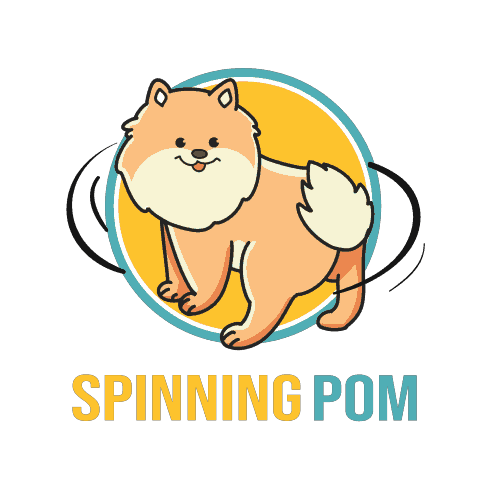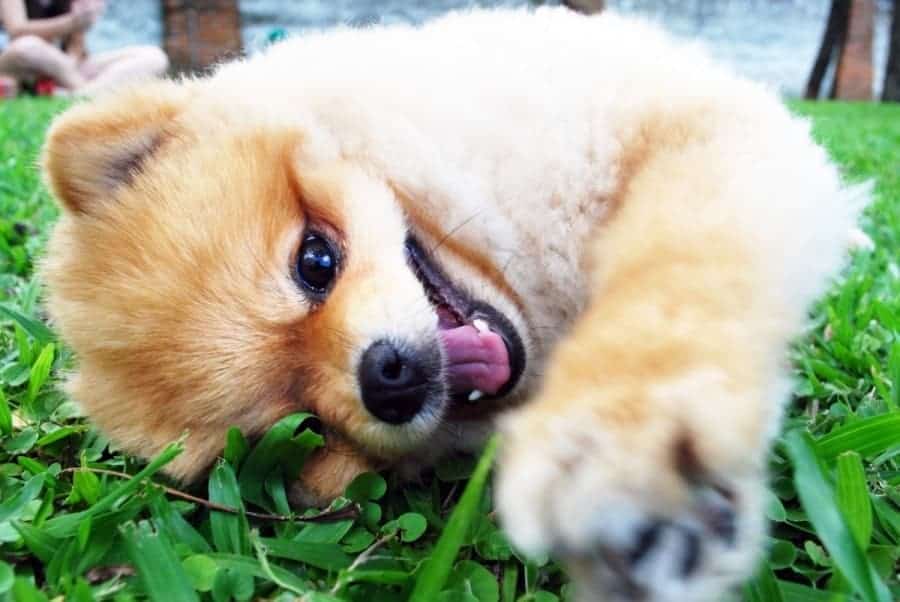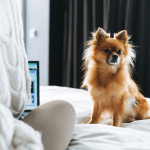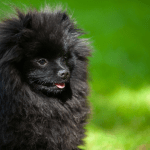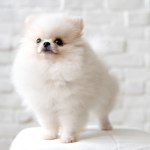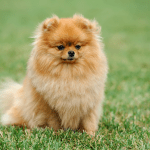Have you ever seen your Pomeranian itching his fur soon after eating? How about them having breathing problems? Or maybe their potty break isn’t as pleasant as normal?
Defining Pomeranian Food Allergies
If any of these symptoms show up in your Pomeranian after eating a meal or having a quick snack, it’s likely your Pomeranian is reacting to the food they’re eating. This isn’t uncommon among Pomeranians or any other dog for that matter since nowadays there are a lot of different food additives that don’t often play nicely with our little joys.
Unfortunately for our Pomeranians this is a common problem and adds up to 10% of all the allergies given to our Pomeranians digestive, respiratory, and skin problems. As a matter of fact, Pomeranian food allergies can come from a wide range of foods including beef, grain, wheat, soy, dairy products, eggs, lamb, and pork.
For caring and responsible pet owners like ourselves, it’s absolutely essential that we keep a close watch on our little Pomeranians and check for common signs of various Pomeranian food allergies. These signs include scratching, diarrhea, upset stomach, coughing, runny nose, and more. By carefully monitoring their diet and eliminating foods depending on whether allergic symptoms occur, your Pomeranian can be cured and healthy in no time.
But exactly which foods are more likely to spring up allergies in our Pomeranians?
Grains
While wheat and soy are some of the most common of these and will be covered further, Pomeranians and other dogs are often sensitive to different grain products. Unfortunately, some of the inexpensive foods use a lot of grain as filler and some even list grain as their primary ingredient. One to watch out for is corn.
Even if your Pomeranian isn’t allergic to corn, some cheap dog food or treats have corn as the first ingredient. Other grains that can cause Pomeranian food allergies include oats, barley, and millet as well as soy and wheat.
Wheat
Carbohydrate-containing foods such as wheat or wheat gluten have also been identified as allergens for Pomeranians. This could be due to a genetic disposition in our Pomeranians which causes rashes and itching upon wheat consumption. If you suspect that your Pomeranian is having an allergic reaction to grain, the best option would be to consult a veterinarian since every breed may have a different reaction.
Soy
In some cases, consuming soy has also been identified as causing Pomeranian food allergies. Despite the many benefits of soy, doctors have said that its harmful effects outweigh the positives. Some of the possible negative side effects include liver disease, kidney infection, thyroid problems, and more. Better to be on the safe side and keep a lookout for soy-based products which may be causing the allergic reactions in your Pomeranian.
Beef
Many people are surprised at how many Pomeranians are allergic to beef. The reason behind the fact is simple – allergies in pets are caused by repetitively feeding them the same food for a prolonged period of time. Many Pomeranian parents are likely feeding their beloved Pomeranian beef and not varying their diet at all.
As a result, allergic symptoms begin to arise years later. Proteins are very common allergens and beef is an even more common component in a lot of pet foods. Eliminating beef is a wise option if you have just begun to monitor your Pomeranian’s diet for food allergies.
Eggs
Next, we have eggs. As surprising as it may seem, the proteins present in egg yolk can also be the cause behind the allergic reactions appearing on your Pomeranian’s body. Your Pomeranian’s immune system may be identifying these proteins as harmful and thus causing the itching reactions.
Eggs can be avoided in their diet by checking the labels on the back of your Pomeranian’s foods. Be sure to check that eggs have not been included on the ingredients list.
Dairy Products
The lactose present in dairy products like milk and yogurt is a common cause of two types of Pomeranian food allergies, namely lactose allergy and lactose intolerance. As a Pomeranian parent, you must take care to distinguish between the two.
Lactose intolerance is characterized by indigestion, vomiting, gas, and diarrhea. Intolerance does not cause skin problems or itching which happens due to a lactose allergy. Diagnosing dairy products as a cause is a tricky business since it’s important to distinguish between the two types.
Lamb
Beef is by far the most commonly used ingredient in Pomeranian dog food. However, when cases of allergic reactions started showing up, companies began to look for a substitute in order to satisfy their growing client base.
Lamb was considered a healthier substitute until its consumption also started to show the signs of irritation and skin problems in Pomeranians. Instead of lamb, a better option to avoid Pomeranian food allergies could be to feed your Pomeranian venison as an allergen-free substitute.
Pork
It’s safe to say that protein-based foods such as pork, beef, and lamb all have the potential to cause some type of allergic reaction. Proteins are the most common types of nutrients which are identified as harmful, resulting in the reaction. Pork is not an exception with respect to causing Pomeranian food allergies.
With all of these potential food allergies your Pomeranians could have, what on earth could be causing these reactions?
Causes for Pomeranian Food Allergies
When I first learned about all the possible Pomeranian food allergies, I was stunned. I had been giving my Pomeranians food that definitely contained many of these ingredients and never thought anything of it. Now that I know what to look for, I’m much more diligent in what I choose for my Pomeranians to eat.
However, it’s true that each Pomeranian is unique and that simply removing all of these different ingredients would be very difficult and not practical. I would go as far to say that removing these foods all together from your Pomeranian’s diet would be a bad idea. The reason being, again, is that all dogs are unique in some way and they very well might be allergic to some of these ingredients, but not all of them. If that’s the case, we’d be restricting potentially necessary vitamins, nutrients, and proteins from our Pomeranians’ diets.
The causes of all these types of food allergies is an important point to note. As we’ve said before, knowing the cause of our Pomeranians’ health problems helps us better understand how to prevent and treat them.
When it comes to grains, Pomeranians are almost unanimously allergic to them in some way. On top of that, corn and other grains are commonly the most plentiful ingredient in cheap dog food. The reason for this is that they’re cheap fillers and some dog food brands get away with this. Because of this, it’s important that you check the ingredients list of your Pomeranian’s food before making any purchases.
Wheat and soy are two other common ingredients that Pomeranians are almost unanimously allergic to. Sadly, the cause is mainly due to their genetic history. Even worse, these types of foods have the potential to cause even worse problems for your Pomeranian, including liver disease, kidney infection, and thyroid problems. I cannot stress enough how important it is to avoid wheat and soy in your Pomeranian’s diet.
Personally, I was totally shocked when I heard a lot of dog food allergies come from meat, more precisely protein-heavy food. To me, this didn’t make any sense. Well, what I learned is that Pomeranians and other small dogs aren’t necessarily allergic to protein in general, but more specifically to certain types of protein-heavy food.
For example, your Pomeranian could be allergic to pork, but for some reason they could be completely fine eating lamb. When it comes to meat, it’s really a case-by-case basis in terms of which protein-heavy food is causing any allergies.
Food allergies are primarily caused when antibodies inside of your Pomeranian mistake protein from food molecules as harmful particles attempt to get rid of them. This can result in rashes and itching. However, as dangerous as Pomeranian food allergies may seem, through careful observation and a lot of love they can be easily identified and your lovely Pomeranian cured in no time.
Aside from the causes listed above, there may very well be others which are causing problems. In the case that symptoms continue to persist in your Pomeranian, allergic reactions may then be caused by factors such as an artificial food coloring or environmental issues like pollen or dust.
With all of these different food allergy sources our Pomeranians are susceptible to, we need to know if there are any preventive measures we can take to avoid any allergic outbreaks that could cause our Pomeranians distress.
How to Prevent Pomeranian Food Allergies
Taking preventive measures when dealing with all kinds of Pomeranian health problems is always a good idea because it means we can avoid potential invasive treatments. Thankfully food allergies of all kinds, whether they’re occurring in animals or people, can oftentimes be treated easily.
The most obvious way of preventing food allergies would be to start feeding your Pomeranian healthy, high-quality dog food from trusted brands. In all likeliness, this means purchasing the more expensive food, but that shouldn’t be a huge burden since Pomeranians don’t eat as much compared to bigger breeds. Even when they’re begging for more food!
It’s also highly advised that you read the ingredients on your Pomeranian’s food to see if it contains any grains, in particular corn, wheat, and soy. As we discussed, these types of ingredients should be avoided at all times since there are essentially zero exceptions when looking at how Pomeranians react. However, ingredients like corn, wheat, and soy are essentially in everything nowadays, including our food! Therefore any form of avoidance to these ingredients is beneficial to your Pom.
Avoiding ingredients such as artificial food coloring, flavoring, and preservatives are also recommended when wishing to prevent food allergies. These are also very common ingredients in all kinds of dog food and should be completely removed from your Pomeranian’s diet. Unfortunately, these types of ingredients are even more common in dog snacks and treats, so keep a lookout.
While one of the more difficult things to do when it comes to being a Pomeranian parent, it’s important not to give your Pomeranian certain people food. If you think the ingredients in Pomeranian food is bad, wait until you look at what’s in our food! If you do give your Pomeranian a little treat of people food from time to time, at the very least avoid giving them certain snacks and all kinds of party food that contains preservatives, additives, corn, wheat, soy, etc.
As you can see, there are numerous ways we can help our Pomeranians avoid common food allergies by just being attentive about what our Pomeranians eat. Giving them a healthy, high-quality food means a lot to the health and happiness of our Pomeranians and being able to give them that is one of the most rewarding feelings.
However, sometimes it’s either too little or too late when enacting certain preventive measures for our Pomeranians’ food allergies. That’s when it’s best to reach out to an experienced veterinary professional to get the right help for your Pomeranian.
Best Ways to Treat Pomeranian Food Allergies
Treating your Pomeranian’s food allergies is an important step forward to ensuring your Pomeranian lives a happy and healthy life. We all know the saying, “you are what you eat” and with Pomeranians it’s not much different. Unfortunately, it’s hard to always stay on top of what our Pomeranians consume and preventive measures can only help so much.
That’s why treating your Pomeranian’s food allergies directly is so important. Once you’ve discovered what your Pomeranian truly is allergic to, you’ll be able to take action to avoid any allergic reactions in the future. You’ll also be more confident that your Pomeranian is feeling like a million bucks!
A great way to discover which food allergies your Pomeranian has is through an elimination diet. If your Pomeranian’s is already showing symptoms of an allergic reaction, it’s a good idea to pinpoint certain foods that contain the common food types we discussed earlier and begin eliminating these ingredients from your Pomeranian’s diet.
This can be very effective because by removing these ingredients, you’re seeing what effect the removal has on your Pomeranian’s health. If they had diarrhea, itchy skin, a rash, or some other allergic reaction, you then remove grain from their diet, and they no longer carry these symptoms, you’ve effectively pinpointed which ingredient is causing problems with your Pomeranian. This simple but effective method can help any Pomeranian parent get to the bottom of their Pomeranian’s food allergies.
Another form of treatment is by strengthening your Pomeranian’s immune system. Believe it or not, this can have serious positive effects on your Pomeranian’s overall health and can even reverse other allergies. Probably the most common method to boost your Pomeranian’s immune system is by giving them Omega-3, Omega-6, and Omega-9 essential fatty acids.
Ideally, these essential fatty acids are given to your Pomeranian on a daily basis and come from all natural, organic sources, especially wild, non-farmed fish. I personally use Pure Wild Alaskan Salmon Oil by Zesty Paws (link to read reviews on Amazon). Every day I add a few drops of these essential fatty acids to my Pomeranians’ breakfasts and they love it. It couldn’t be easier!
Treating your Pomeranian’s skin is another important characteristic when dealing with food allergies. Luckily this is very easy and just requires some simple and regular hygienic routines. Whenever you give your Pomeranian a bath, be sure to use shampoo that’s protein-infused to strengthen your Pomeranian’s hair and skin while also containing vitamin E and soothing aloes. I personally wash my Pomeranians every two weeks to keep them fresh and clean!
Another useful treatment is to give them a daily spray of moisturizer. While this is more aimed at their coat, it does penetrate to the skin and can provide a wealth of vitamins and minerals that can keep your Pomeranian’s skin and coat safe from the elements. Most importantly, these sprays are usually antifungal, antibacterial, and ease symptoms of yeast, fungus, and bacteria. I give my Pomeranians a little spritz on a daily basis, usually before and after their daily brush.
In the end, you’ll likely want to speak to your veterinarian because you don’t want to risk being in the dark when it comes to your Pomeranian’s allergies. If your Pomeranian has a serious allergic reaction to a particular food, there are medication options such as antihistamines (like Benadryl), corticosteroids, creams and lotions, eye drops, and various antibiotics. While some of this may seem quite intense, if your Pomeranian has an extreme allergic reaction that causes them to miss out on a happy and healthy life, you’ll need to seek professional help.
When Pomeranians have particular food allergies, it can be rather easy to pinpoint, prevent, and treat, but some Pomeranians react differently than others. Be sure to communicate as much as you can to an experienced veterinarian if you start noticing symptoms of any kind.
